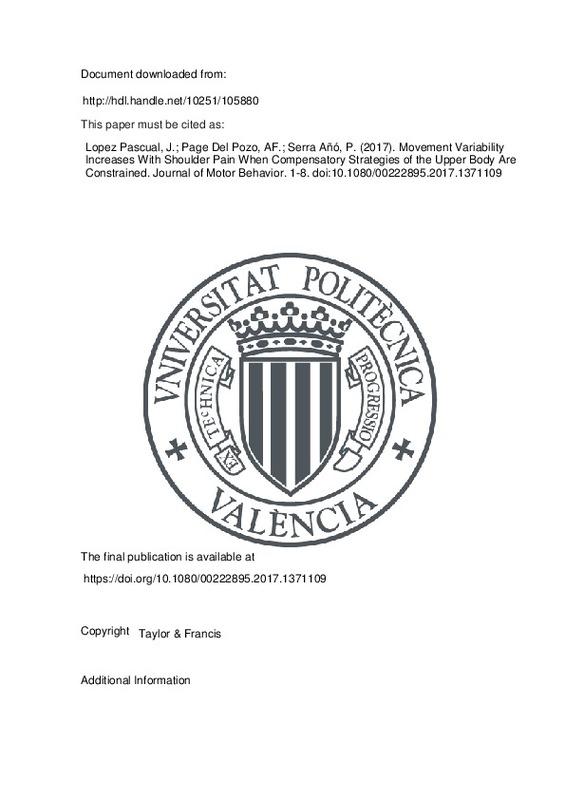JavaScript is disabled for your browser. Some features of this site may not work without it.
Buscar en RiuNet
Listar
Mi cuenta
Estadísticas
Ayuda RiuNet
Admin. UPV
Movement Variability Increases With Shoulder Pain When Compensatory Strategies of the Upper Body Are Constrained
Mostrar el registro sencillo del ítem
Ficheros en el ítem
| dc.contributor.author | Lopez Pascual, Juan
|
es_ES |
| dc.contributor.author | Page Del Pozo, Alvaro Felipe
|
es_ES |
| dc.contributor.author | Serra Añó, Pilar
|
es_ES |
| dc.date.accessioned | 2018-07-16T07:27:14Z | |
| dc.date.available | 2018-07-16T07:27:14Z | |
| dc.date.issued | 2017 | es_ES |
| dc.identifier.issn | 0022-2895 | es_ES |
| dc.identifier.uri | http://hdl.handle.net/10251/105880 | |
| dc.description.abstract | [DE] This cross-sectional study analyzed the influence of chronic shoulder pain (CSP) on movement variability/kinematics during humeral elevation, with the trunk and elbow motions constrained to avoid compensatory strategies. For this purpose, 37 volunteers with CSP as the injured group (IG) and 58 participants with asymptomatic shoulders as the control group (CG) participated in the study. Maximum humeral elevation (Emax), maximum angular velocity (Velmax), variability of the maximum angle (CVEmax), functional variability (Func_var), and approximate entropy (ApEn) were calculated from the kinematic data. Patients' pain was measured on the visual analogue scale (VAS). Compared with the CG, the IG presented lower Emax and Velmax and higher variability (i.e., CVEmax, Func_var, and ApEn). Moderate correlations were achieved for the VAS score and the kinematic variables Emax, Velmax and variability of curve analysis, Func_varm, and ApEn. No significant correlation was found for CVEmax. In conclusion, CSP results in a decrease of angle and velocity and an increased shoulder movement variability when the neuromuscular system cannot use compensatory strategies to avoid painful positions. | es_ES |
| dc.description.sponsorship | This work was funded by the Spanish Government and cofinanced by EU FEDER funds (Grant DPI2013-44227-R) | |
| dc.language | Inglés | es_ES |
| dc.publisher | Taylor & Francis | es_ES |
| dc.relation.ispartof | Journal of Motor Behavior | es_ES |
| dc.rights | Reserva de todos los derechos | es_ES |
| dc.subject | Humeral elevation | es_ES |
| dc.subject | Neuromuscular control system | es_ES |
| dc.subject | Shoulder pain | es_ES |
| dc.subject | Variability | es_ES |
| dc.subject.classification | FISICA APLICADA | es_ES |
| dc.title | Movement Variability Increases With Shoulder Pain When Compensatory Strategies of the Upper Body Are Constrained | es_ES |
| dc.type | Artículo | es_ES |
| dc.identifier.doi | 10.1080/00222895.2017.1371109 | es_ES |
| dc.relation.projectID | info:eu-repo/grantAgreement/MINECO//DPI2013-44227-R/ES/METODOLOGIA DE DISEÑO DE SISTEMAS BIOMECATRONICOS. APLICACION AL DESARROLLO DE UN ROBOT PARALELO HIBRIDO PARA DIAGNOSTICO Y REHABILITACION/ | es_ES |
| dc.rights.accessRights | Abierto | es_ES |
| dc.date.embargoEndDate | 2018-10-13 | es_ES |
| dc.contributor.affiliation | Universitat Politècnica de València. Departamento de Física Aplicada - Departament de Física Aplicada | es_ES |
| dc.contributor.affiliation | Universitat Politècnica de València. Instituto Universitario Mixto de Biomecánica de Valencia - Institut Universitari Mixt de Biomecànica de València | es_ES |
| dc.description.bibliographicCitation | Lopez Pascual, J.; Page Del Pozo, AF.; Serra Añó, P. (2017). Movement Variability Increases With Shoulder Pain When Compensatory Strategies of the Upper Body Are Constrained. Journal of Motor Behavior. 1-8. https://doi.org/10.1080/00222895.2017.1371109 | es_ES |
| dc.description.accrualMethod | S | es_ES |
| dc.relation.publisherversion | https://doi.org/10.1080/00222895.2017.1371109 | es_ES |
| dc.description.upvformatpinicio | 1 | es_ES |
| dc.description.upvformatpfin | 8 | es_ES |
| dc.type.version | info:eu-repo/semantics/publishedVersion | es_ES |
| dc.identifier.pmid | 29028425 | |
| dc.relation.pasarela | S\356176 | es_ES |
| dc.contributor.funder | Ministerio de Economía, Industria y Competitividad | es_ES |







![[Cerrado]](/themes/UPV/images/candado.png)

